The song itself.
Actually, we cry throughout the entire film. The story begins with Tina's funeral, where she leaves behind a destraught Rahul and their baby daughter, Anjali. Tina has prepared eight letters to be opened and read on Anjali's first eight birthdays. Fast forward eight years, and Anjali (Sana Saeed) sneaks downstairs to read her last letter. In it, Tina drops the bomb: back in college, Rahul had been best friends with another Anjali. Big Anjali had been a gum-chewing, basketball-playing, swaggering tomboy. When Tina transferred to their college, Rahul was immediately smitten. This provoked Anjali to jealousy, and then she realized her feelings: she was in love with Rahul. Yet through misunderstanding, clumsiness and embarrassment, Anjali was unable to tell Rahul, and meanwhile Rahul and Tina fell for each other. Tina, being a fellow woman folk, understood Anjali's plight. Rahul knew nothing. Eventually, Rahul and Tina got engaged and Anjali fled, hiding herself in another city (Delhi, for the curious).
Then Tina passed away and, as her dying wish, wrote the eighth letter to her daughter, asking little Anjali to unite her grieving, widowed father with lonely big Anjali. They were made for each other after all, and Tina wanted Rahul to find happiness again. So little Anjali, conspiring with her grandparents, begins to track down big Anjali and arrange for the reunion which will (hopefully) wake Rahul up to big Anjali's feelings. Unfortunately, as the above tearjerker song illustrates, Anjali, who has now grown out of her awkward tomboy stage and has acquired more feminine poise and style, is getting engaged to Aman. Aman is thrilled, Anjali is clearly not. But she sees no point in mourning for Rahul anymore and decides "settling" for someone is better than nothing. Of course, when little Anjali learns this, the pressure is on!
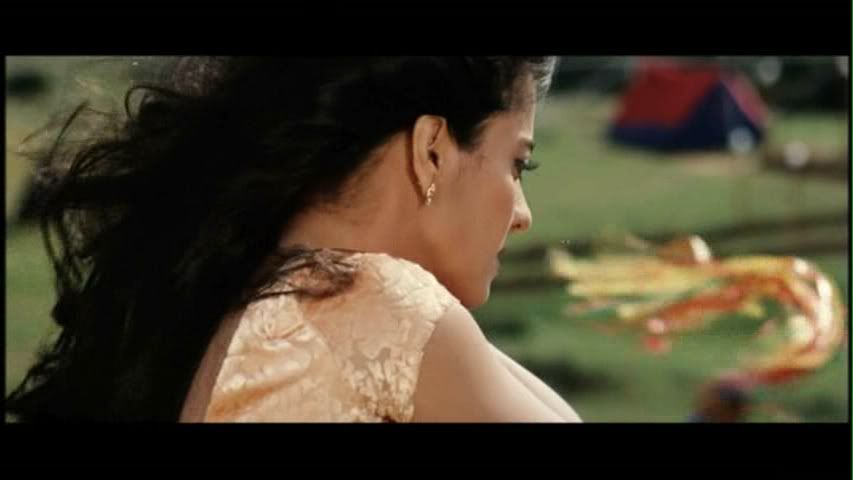
Big Anjali.
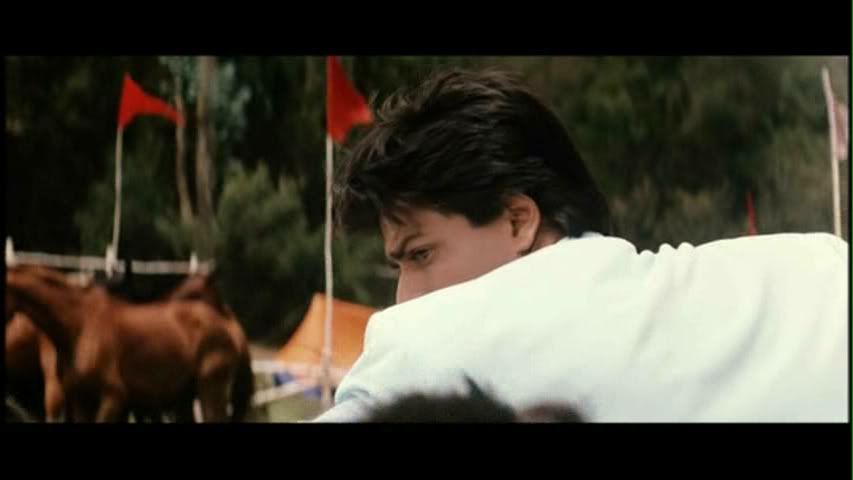
Rahul.
In some ways, this film is fairly typical Karan Johar (cf. Kabhi Khushi Kabhie Gham, Kabhi Alvida Naa Kehna, Kal Ho Naa Ho) and even fairly typical Hindi. If the PPCC was cruel, we would pick apart the whole gender role transition, when Anjali matures into a more conservative "feminine" stereotype, all flowing saree and makeup and music-teaching, and this is seen as desirable and hence meriting Rahul's attentions, as an evil of patriarchal society. Yet we won't, partly because we are not cruel, we don't want to pick this apart, and we can even excuse this sequence as merely using conventional cultural gender roles to get across the inoffensive message: Anjali used to be awkward and clumsy, then she became attractive. Ugly duckling, etcetera etcetera. Similarly, we could unleash another cruelty about the whole xenophobic and nationalistic anxieties in Karan Johar movies, where Britain must perforce be mocked and kicked down, and India must perforce assert its cultural and economic validity. An excellent example being the song Vande Mantaram from Kabhi Khushi Kabhie Gham. Perhaps Johar is pandering to the home audiences here, as he is often criticized for making films which are too NRI-centric (though Kuch Kuch Hota Hai barely suffers from this). But, again, we can't accuse it of being too bad - sure, the Anglophile played by Johnny Lever is endlessly ridiculed, but the song when they attempt to convert him back to Hindustanism (the gorgeous Raghupati Raghav, also featured in Richard Attenborough's Gandhi) is just wonderfully done and would really make anyone want to get in touch with their Hindustani dil (the PPCC included!). And the reunion between Rahul and Anjali, with its glorious, wonderfully protracted awkwardness, is so sweet that, despite ourselves, we usually start to cry again.
Raghupati Raghav, gorgeous. And the PPCC loves the jab at the Western hippies on the Ancient, Mystical India-obsessed hippie trail.
What we're saying is that all criticisms wash away: this is a good-hearted film. Or, at least, it has a certain special sauce that speaks to our squishy heart, and it just makes us cry and cry like hungry babies. We still don't understand why, because we also sometimes think, "Ugh, awful!" as we sob and reach for Kleenexes. For example, the entire first act, with a college setting that resembles, to a worrying degree, Saved by the Bell, has many a cringe-worthy moment. Tina purportedly just transferred from Oxford; wonder what she's thinking! Also, some of the songs are forgettable and some, such as Yeh Ladki Hai Deewana, are downright awful. Karan Johar exhibits his typical trait of overusing the movie's main theme (nice as it always is), and the child actress playing little Anjali is also not so great. And didn't we once say we would never support Salman Khan because of certain rumors of abuse?
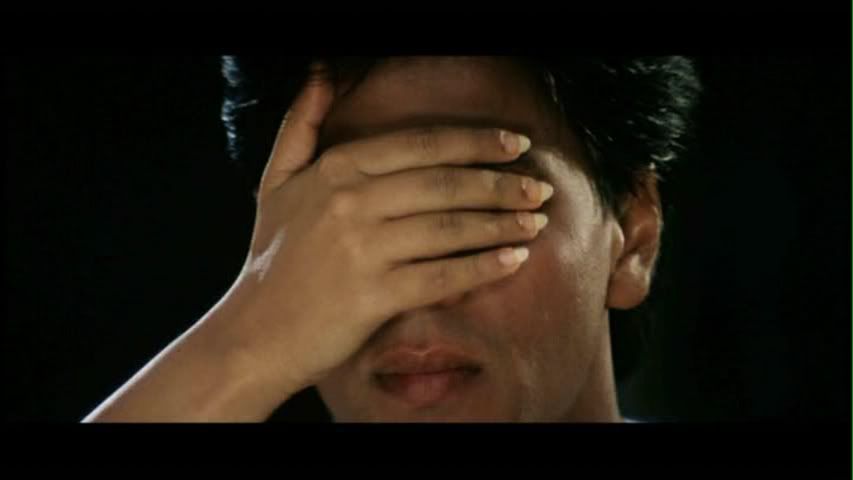
See no evil.
What can we say? Karan Johar became famous with this movie for a reason. It is infinitely charming. It is highly enjoyable. It's popcorn, it's chocolate, it's curling up with a gossip magazine. And unlike all of these things, it's also cathartic; let its tearjerking magic wash your quotidian worries away! In fact, like Dilwale Dulhania Le Jayenge, this is one of those movies that, when finished, causes the PPCC to feel disappointed with our dreary, unromantic life. That's probably not a very healthy attitude, but it does reflect the powerful aesthetics of these films. Talk about escapism! We don't want to come back!
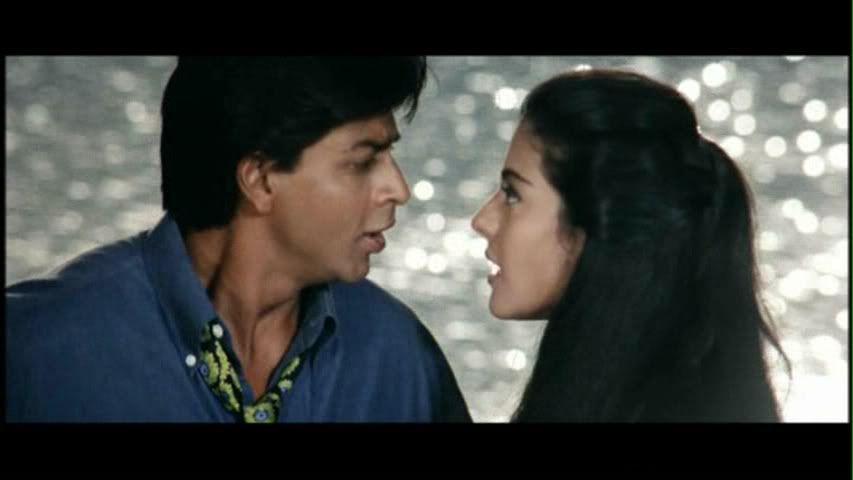
Lubbly.
Shah Rukh Khan is turned on to All Engines Shah Rukh Khan in this. He does the dimple thing, the eyebrow thing, the stutter thing. All his things, and they are all effective and lovable for those that love him. A one-trick pony he may be, but such a pretty, pretty pony nonetheless! But even that is cruel, because his transition from the immature, innocent Rahul of Act One to the aged widower in Act Two is subtle and poignant. Kajol, likewise, impresses with her ability to go from bouncy to subdued; but we already knew she could do that ever since Baazigar. These two together are delightful. You like them both, and you want them both to just be happy. Salman Khan is good as the naive, Westernized Aman, but we found it difficult to suspend our disbelief because of the whole Aishwarya thing. The rest of the supporting cast is acceptable; Anupam Kher is notably good in this, we love it when he plays the sympathetic father figure who cries (more than when he plays the clown, as in Mohabbatein or, to some extent, Darr). Also, the little mute Sikh boy at summer camp is unbelievably cute and cheeky. The PPCC is filling out his adoption papers now.
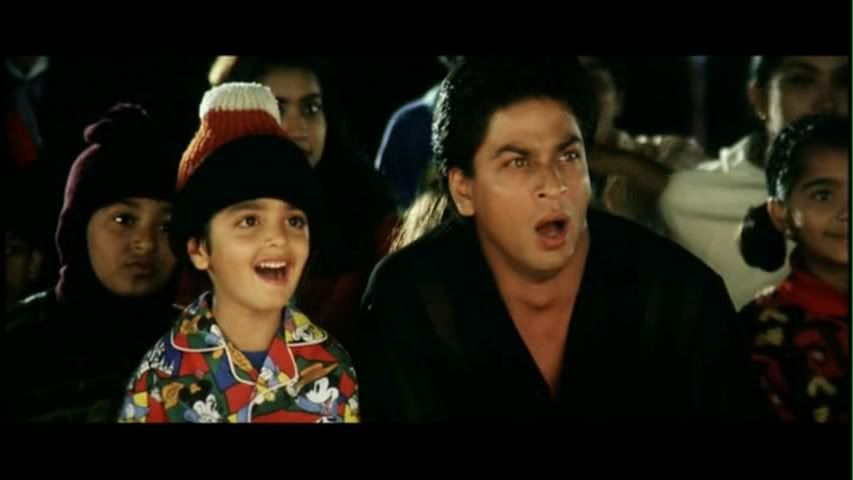
Awwww.


6 comments:
I also feel disappointed with my dreary, unromantic life in the face of movies like this, and I just hope it's mostly because of the movie that I feel that way and not due to some other depressing force.
I can't/won't forget/forgive the tomboy=unlovable/girly=lovable thing, but every time I watch I think "that sucks and it annoys the crap out of me" and move on. It's not that it's not important to me, but other parts of the movie affect me more, and I guess I'm content enough to be swept along in the many things the movie offers that I do like to think about. It's all v complicated. As you say, I do want them to be happy, and most everything else is duly noted but then overshadowed by that wish. KJo is pretty crafty for making me care so much. The movie's charms were not as effective the first two times I saw it, but after that I was sunk.
Hello,
I appreciated your powerless "we cry" about DDLJ, and it's so true! I would add, too, that "we laugh" and perhaps therein lies the charm which this movie so strongly conveys: a mixture of hope for love to live and bloom, and a ravishment when it does. And then all along, that fun at seeing the two lovers now apart, now close, that giggling that tells us: they will meet in the end, not to worry. We are made to fear, but down deep, we know we are OK. They're OK.
cheers
yves
Great review! Another movie I need to repost on--my review,one of the first I did, basically gushed about how this is my favorite film.
But you've really captured it all here, the good and the bad...
The bad, because, well, there are (as you point out) so many things wrong with this film! And yet--it works. It just does. I think its one of the Seven wonders of Bollywood. Bad lines, some forgettable songs, cheese beyond belief=lovable and endearing film. Go figure.
This has, for me, been one of those films that has stood the test of time. The more I watch it, the more obsessed with it I become.
Of course, I haven't really seen any of those 70s masala "dil-squish" films you love so much. Is there any post on your blog that would be a Beginner's Guide to 70s Dil-Squish Masala? If not, could you give me a lil' list to start with?
Nida - Thanks for all the great comments! I love hearing your reactions to the movies and to the reviews. In terms of a Beginner's Guide to Masala, there are some under my Recommended Viewing (India) post, as well as Beth's post on foundation masala films.
Off the top of my head, I would recommend: Amar Akbar Anthony, Roti Kapada Aur Makaan, Deewaar (but only because it's "important"), Suhaag, Parvarish, and Kasme Vaade (which was, after all, the first masala film I saw!). Ram Lakhan was made much later than the 1970s prime, but it's nonetheless a really well-made 1970s-mold masala film.
My last trolling destination (am waiting for your Asoka review now. When?)
My 1st SRK movie is Maya Memsaab (the uncut overseas version), followed by DDLJ (watched on UK tv by myself in my friend's dark living room) and both left me unimpressed. Going home where SRK-obsession in my country just turned me off him (I harbour deep suspicions on any over-hyped celebrity) didn't help promote KKHH when it became the "next best thing after tandoori chicken" on the year of its release. I just watched it from a friend's rented VHS out of boredom. I ended up pwning the vid and watching it 20++ times.
It was KKHH that has led me to my obsession with all things SRK. Despite my v.low opinion of Rahul's character (the guy is such a selfish jerk!), SRK just got it right with all the emo~~ (IMO, anyway). I remember sitting in my bro's bright living room going..yes! that's exactly how I would feel too!..while reaching for tissues. Till date, my most fave movie of all times.
Dear P-Pcc :) I was thinking of you today, because I was reading this Blog - and laughed my ass off and thought you would enjoy this as much as I did :)
-Hope you are doing well :D
http://imaansheikh.wordpress.com/2014/05/27/90s-pictorial-film-rewind-kuch-kuch-hota-hai/
Post a Comment